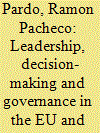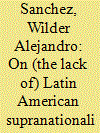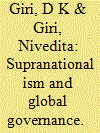|
|
|
Sort Order |
|
|
|
Items / Page
|
|
|
|
|
|
|
| Srl | Item |
| 1 |
ID:
116682


|
|
|
|
|
| Publication |
2012.
|
| Summary/Abstract |
For scholars and practitioners of European politics alike, the distinction between supranationalism and inter-governmentalism has always been fundamental. This distinction has underpinned the various schools of European integration theory, just as it has remained crucial for European governments keen to demonstrate that the Member States remain in charge of key policy areas. Nowhere is this considered to be more central than in the area of foreign and security policy, which has consciously been set within the rigid intergovernmental framework of Pillar Two of the Maastricht Treaty and, under the Lisbon Treaty, remains subject to the unanimity rule. However, scholarship on the major decision-making agencies of the foreign and security policy of the EU suggests that the distinction is not only blurred but increasingly meaningless. This article demonstrates that, in virtually every case, decisions are shaped and even taken by small groups of relatively well-socialized officials in the key committees acting in a mode which is as close to supranational as it is to intergovernmental.
|
|
|
|
|
|
|
|
|
|
|
|
|
|
|
|
| 2 |
ID:
111023


|
|
|
|
|
| Publication |
2012.
|
| Summary/Abstract |
The global financial crisis of the late 2000s has affected the EU and East Asia differently. The EU has seen its economic, political and social structures undermined by the problems derived from the global crisis and subsequent eurozone sovereign debt crisis. In contrast, East Asia has gone through the global crisis relatively unscathed and has seen its standing at the global level reinforced. As a result, there has been a reconfiguration of leadership, decision-making and governance structures in both regions. In the case of the EU, Germany has emerged as the clear leader of European efforts to solve regional economic problems. Meanwhile, intergovernmentalism has replaced supranationalism as the decision-making and even implementation procedure of choice. Differently, there is no single leader in East Asia. China has become one of the most important powers at the global level, but at the regional level, different countries have shaped East Asia's response to the crisis. Concurrently, there has been some move towards increasing integration, even though intergovernmentalism still defines governance structures in the region. Thus, the global financial crisis of the late 2000s has helped to shape new leadership, decision-making and governance structures in both regions.
|
|
|
|
|
|
|
|
|
|
|
|
|
|
|
|
| 3 |
ID:
143340


|
|
|
|
|
| Summary/Abstract |
That the Lisbon Treaty lays the foundation for a supranational asylum and immigration policy is surprising, even more so for Liberal Intergovernmentalism (LI), whose founder Andrew Moravcsik predicts that no such development will take place. While the article uses LI as its point of departure, it shows that it runs into problems with regards to the policy area of asylum and immigration. The article therefore turns to the (neo-)functionalist concept of spillover. While working with the concept, it was deemed necessary to create a more coherent typology of different spillovers. The article suggests that the concept of spillover may be both descriptive and explanatory. With regards to descriptive spillover, it seems valuable to differentiate between widening and deepening spillovers, but concerning explanatory spillovers, more options became visible: there are unintended or intended functional spillovers, as well as unintended political, cultivated and social spillovers. The argument is illustrated through a detailed study of Sweden – a ‘reluctant European’ that within the area of asylum and immigration made a fundamental U-turn with regards to a supranationalism, a change that can be described as a social spillover.
|
|
|
|
|
|
|
|
|
|
|
|
|
|
|
|
| 4 |
ID:
154341


|
|
|
|
|
| Summary/Abstract |
This commentary discusses the state of supranationalism in Latin America. We will enumerate the numerous regional organizations in the Western Hemisphere, and also discuss their successes and failures at regional integration. While integration has had some successes, supranationalism has yet to flourish among Latin American states and it will probably not for the immediate future. Empirical evidence suggests that, while inter-state warfare is scarce in the region, there are still too many inter-state tensions, including ongoing border disputes, as well as occasional incidents, which prevent supranationalism from taking hold. This explains the lack of a North Atlantic Treaty Organization-esque type South American bloc. Nevertheless, small-scale integration projects have been successful, like visa waivers systems, educational programs or defense-cooperation projects. Ultimately, in a changing global geopolitical system, the distrust for supranationalism remains the same in Latin America.
|
|
|
|
|
|
|
|
|
|
|
|
|
|
|
|
| 5 |
ID:
080327


|
|
|
|
|
| Publication |
2007.
|
| Summary/Abstract |
This article addresses an arresting conjuncture: the fact that the international community's involvement in states' affairs frequently coalesces around a state's management of internal difference. I outline striking parallels in the ways relations between supranational bodies, some European states, and their minorities were reconfigured in two post-imperial moments: the decade following the Great War and the present period of post-socialist transformation. In both periods supranational bodies developed regimes of supervision whose rationale and focus were minority rights and the state's governance of difference. Examining a figure I call "the supervised state," I reflect on its implications for theorisations of state and sovereignty. I place these moments of intensified supervision of selected states within a larger history of supranational scrutiny and a political landscape that entailed a spectrum of sovereignties
|
|
|
|
|
|
|
|
|
|
|
|
|
|
|
|
| 6 |
ID:
094809


|
|
|
| 7 |
ID:
125268


|
|
|
|
|
| Publication |
2013.
|
| Summary/Abstract |
A globalised world has problems which are global in their spread and consequences. Logically then, such problems will require solution that can be delivered only by global initiatives and institutions, or in other words, global governance. But, what is global governance? Global governance is based mainly on intergovernmentalism, which negotiates respective national interests, but does not secure common interest.
|
|
|
|
|
|
|
|
|
|
|
|
|
|
|
|
|
|
|
|
|